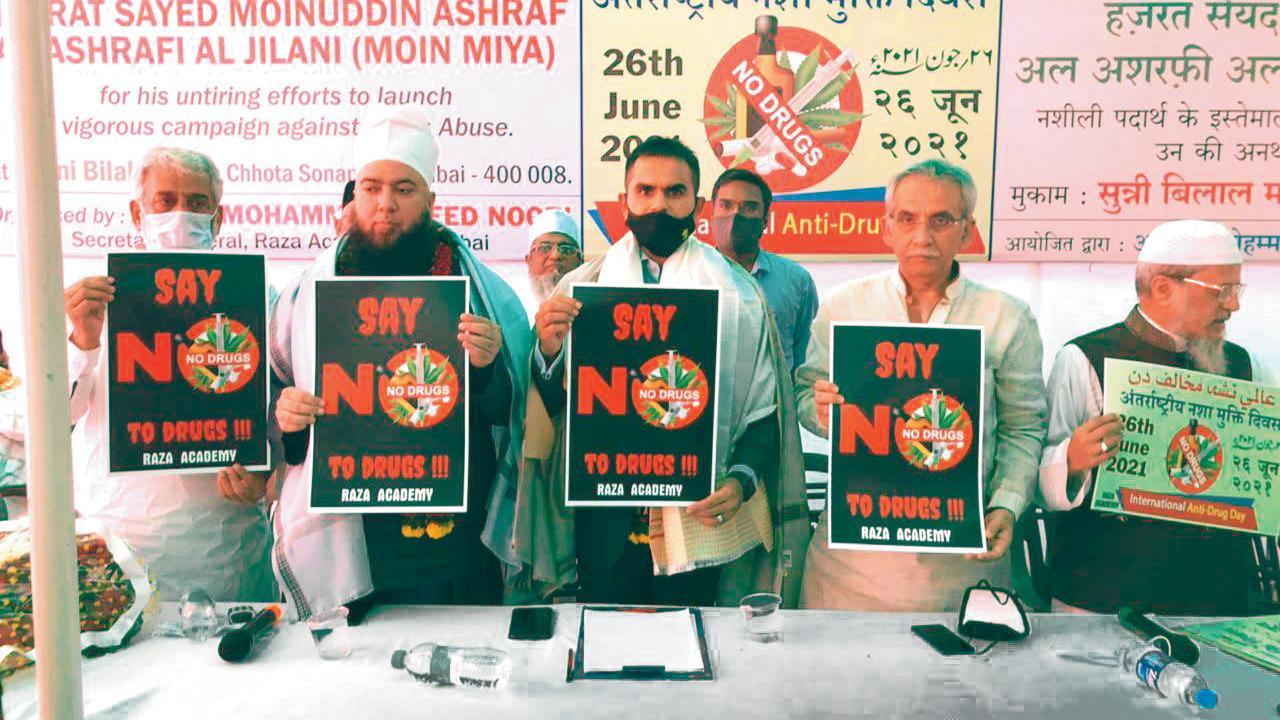On International Day Against Drug Abuse and Illicit Trafficking, NCB says law enforcement their job but must focus on awareness and rehabilitation too, community leaders commit to help affected youth

Sameer Wankhede addressed South Mumbai clerics from across sects at the Sunni Bilal Masjid
The Narcotics Control Bureau (NCB) on Saturday, initiated an awareness campaign against drug use and trafficking with the help of religious leaders from the Muslim community. NCB Zonal Director Sameer Wankhede and his team visited the Juma Masjid in South Mumbai on June 26, which is marked as the International Day Against Drug Abuse and Illicit Trafficking, to launch a campaign focusing on Muslim youth.
ADVERTISEMENT
“We have found that youths are getting into trafficking because of illiteracy, poverty, unemployment and bad company. We have targeted many areas and are now reaching out to religious leaders to stop Muslim youths from getting into drug trafficking,” Wankhede told mid-day.
How many will we arrest?
Apart from South Mumbai, many areas of which are heavily populated by Muslims, the NCB has also reached out to religious leaders in Andheri, Lokhandwala, Govandi, Mankhurd, Malwani and Mira Road. “We will keep enforcing the law, but how many people will we arrest? Awareness with the help of religious leaders can play a major role. Those involved in drug use can be sent to rehabilitation centres. We need the society’s help to control the drug menace,” he said.
Before reaching out to the religious leaders, NCB also studied parts of the Quran and Hadith (collected traditions of prophet Muhammed based on his sayings and actions) that deal with drug use. “I told religious leaders that Muslims don’t drink because liquor is forbidden in Islam. Likewise, there are parts of Quran and Hadith that prohibit consuming drugs,” Wankhede said.
The agency requested the NCB to use these to encourage youth to avoid drugs. “We have asked them to make announcements during prayers, especially on Friday and during religious gatherings. We believe this will bring a major change and aid parents of children affected by the drug menace,” Wankhede said.
Congress MLA from the Mumbadevi constituency, Amin Patel, said, “I don’t think the problem is limited to the Muslim community. It has become a problem for every community. We have been doing campaigns from mosques in our area. NCB’s positive approach will be instrumental in reducing the drug menace.”
Need effective local cops
Wankhede and his team also visited the Sunni Bilal Masjid at Grant Road and addressed South Mumbai-based Muslim clerics from across sects.
“It is high time that we accept that there is a drug problem among our community’s youth. We have been campaigning for 10 years. The problem is unemployment which drives them to drug trafficking for easy money and then into addiction and other crimes. We need to accept that first to save our youth,” said Maulana Moin Miya. Clerics also believe that local police are not dealing with the issue effectively despite knowing of major dealers and suppliers. “The NCB has cracked down on the major suppliers. But the local police need to do their job more effectively,” Moin Miya added.
Juma Masjid to counsel drug users in NCB custody
The Juma Masjid of Bombay Trust appointed a team of six Islamic scholars to conduct rehabilitation and counselling of repeat drug users while they are in the custody of the Narcotics Control Bureau (NCB).
Sameer Wankhede (sitting in centre) with Shoaib Khatib, trustee and chairperson of the Juma Masjid of Bombay Trust (in black)
The decision was taken after community leaders met with NCB Zonal Director Sameer Wankhede on Saturday. Trustee and chairperson of the Juma Masjid of Bombay Trust Shoaib Khatib said, “The aim is to focus on people using drugs, and not peddlers. There are kids and youth who are taken into custody for a few days by the NCB for using drugs. While they are in custody, our muftis [scholars] and community counsellors will meet them and explain the harmful effects of drugs on one’s health and family.”
Khatib added, “After getting bail, the person will go through withdrawal. If someone has no money to buy drugs, they would start selling them to finance their addiction. If that doesn’t work, they will resort to thieving. Eventually, one ends up becoming a criminal. We need to explain these things to the afflicted youth.” Khatib said several South Mumbai areas have a growing drug problem. These include Bhindi bazaar, Dongri, and some pockets near JJ Hospital. “There are also some areas where only migrant workers live. They don’t have family here and have easy access to cheap drugs. Mostly the poor are getting affected and their exposure to cheap drugs is much more.”
- Gaurav Sarkar
 Subscribe today by clicking the link and stay updated with the latest news!" Click here!
Subscribe today by clicking the link and stay updated with the latest news!" Click here!






